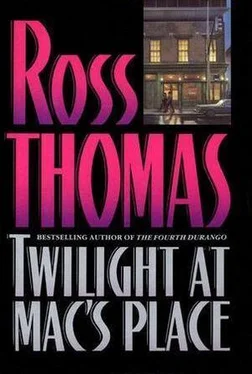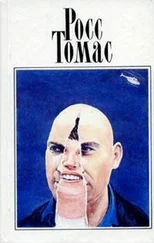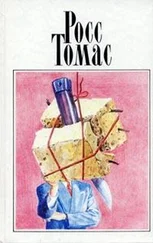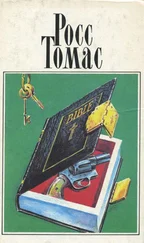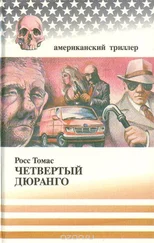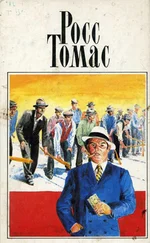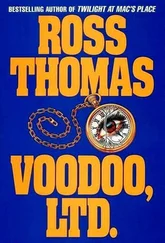The leaning thief turned and called, “He’s got my piece, Marv!”
“Lemme out!” Marv yelled.
McCorkle jumped down from the trunk, raised its lid, put a lock on Marv’s right arm, pulled him out of the trunk and marched him over to Padillo. Tears rolled down Marv’s cheeks toward a fixed smile that displayed a great deal of gum.
“Big bastards, aren’t they?” McCorkle said.
Padillo looked at the man with the apparently perpetual smile. “You’re Mr. Schlitz, right? And your partner here’s Mr. Pabst.”
Schlitz’s tears had stopped but the smile was still in place as he nodded. Mr. Pabst wiped his tiny nose with the back of an immense hand.
“Something funny?” McCorkle asked the smiling Schlitz.
Schlitz shook his head but the smile didn’t go away. Pabst said, “He can’t help it. It’s a nervous thing.”
“Reflex.” Schlitz explained, still smiling. “A nervous reflex.”
“What did Harry Warnock say to look for in my car?” Padillo asked.
Pabst shook his head and said, “You’re not gonna shoot us.”
“What you mean is I’m not going to kill you,” Padillo said. “But try this on: a citizen comes out of a bar and finds two thieves stealing his car. The citizen takes a pistol away from one of the thieves and shoots him in the knee. The other thief comes down with a sudden case of good sense and surrenders. Think the cops will like that?”
“They’ll love it,” McCorkle said. “But how do you decide whose knee?”
“Flip a coin and let them call it.”
“And the one who loses the call loses the kneecap,” said McCorkle, nodding judiciously. “It’s only fair.”
“Harry didn’t send us,” Pabst said.
“No?” Padillo said. “Who did?”
“Nobody.”
“Flip the coin,” Padillo said to McCorkle.
“We heard you talking about the book.” Schlitz said, hurrying to get the words out. “The memoirs.” His smile was back after disappearing momentarily when he closed his lips to say the b’ s and the m’ s.
“Why’d you think the memoirs would be in my car?”
“The way you were talking in there,” Schlitz said. “You were talking real money, three quarters of a mill or more, so we figured you’d keep the thing close by.”
“How’d you know this was my car?”
“When you and him were in the head, we asked Pong what kind of cars you guys drive. He said he didn’t know about your partner here, but you always drove a real old dark green Mercedes coupe. It wasn’t hard to spot.”
“And what were you going to do with the manuscript?” McCorkle asked.
Pabst shrugged. “Sell it back to you.”
“For how much?”
“We hadn’t got that far.”
His disbelief obvious, Padillo said, “And you thought all this up in the five minutes it took us to pee and tell Billy Pong good-bye?”
“If you get an idea, you gotta go with it,” Schlitz said.
McCorkle reached Schlitz with a single step. “I’d better pop this liar back in the trunk while you kneecap the other one.”
The words came tumbling out of Pabst’s mouth, tripping over themselves. “Tinker Burns,” he said. “We were gonna take the thing to Tinker Burns.”
Padillo looked first at McCorkle, who raised an eyebrow that managed to express doubt, surprise and even a little disappointment. Padillo looked back at Pabst. “From the beginning” he said and glanced at his watch. “We’ve got all night.”
It didn’t take all night. It took only fourteen minutes for Pabst and Schlitz, sometimes interrupting and contradicting each other, to describe how Tinker Burns had hired them through Harry Warnock for a vague one-shot that might involve a little breaking and entering.
After first complaining about how little they had been paid, $2,000 apiece, they described how they had shot Steadfast Haynes’s horse, broken into his farmhouse, searched it and bound and gagged “some woman” who walked in on them. But they vehemently denied — despite repeated questions from Padillo and threats from McCorkle — that they had found any trace of the Haynes manuscript.
“What’d Tinker say when you told him all this?” McCorkle said.
“He was sort of pissed off,” Pabst said.
“If you think he was pissed off, imagine what Harry Warnock’s going to be when I tell him I caught you burgling my car.” Padillo paused. “And why.”
Schlitze eyes darted quickly away to his left, Pabst stared down at the parking lot asphalt.
“Harry’s mean,” McCorkle said, making it sound as if he were musing aloud. “And he also knows all those IRA interrogation techniques. The nasty stuff. The first thing he’ll probably ask you is whether you’re really working for him or for Tinker Burns. And no matter what you tell him, he’ll have to make sure you’re not lying.”
Pabst, still staring at the asphalt, muttered, “Harry don’t have to know.”
“Sorry?” Padillo said.
Pabst looked up. “I said Harry won’t know if you don’t tell him.”
“Why wouldn’t I tell him? You sliced my car top. But Harry won’t pay for it unless I tell him what you two did and why.”
“Maybe we could work it out,” Schlitz said with a broad smile utterly lacking in confidence.
“How?”
“I mean if you guys need something done, well, maybe we could do it and that’d sort of pay for your car top and then Harry wouldn’t have to know about this.”
Padillo studied Schlitz for a moment before asking, “Does Tinker Burns worry either of you?”
“Nope,” Pabst said. It was a quick answer and McCorkle thought it was probably far too quick.
“Then you wouldn’t mind lying to him, would you?” Padillo said.
After a cautious nod, Pabst said, “Go on.”
“We want you to call Tinker at his hotel,” Padillo said. “If he’s not there, leave a message. The message will say only that you’ve learned that McCorkle and Padillo have the Haynes manuscript. That’s all. But if Tinker himself answers the phone, tell him you were at Pong’s with Harry Warnock and the lads and heard talk that McCorkle and I have the Haynes manuscript. When Tinker asks for details, tell him that’s all you know. Absolutely all.”
It was Schlitz who repeated a reasonably close version of the instrucotions and asked, “When d’you want us to call him?”
“Now,” Padillo said.
“I’ll use your car phone.”
“I don’t have a car phone.”
Not bothering to conceal his astonishment, Schlitz said, “Jesus, everybody’s got a—”
“I don’t,” Padillo said.
“He doesn’t have a fax machine either,” McCorkle said.
“Well,” Schlitz said, “I guess we can use the phone in my car.”
After McCorkle knocked on the hotel room door, it was opened by his daughter, who apparently wore nothing other than a man’s white oxford shirt and it rather loosely buttoned.
“They have house phones in the lobby,” she said.
“We can wait out here till you get—”
McCorkle was interrupted by Granville Haynes’s voice from behind the partially open door. “Who is it?”
“It’s Pop and the old guy who rides shotgun.”
“Then ask them in.”
“You’re invited,” she said, walked away from the half-open door and disappeared into the bathroom.
McCorkle entered the room, followed by an amused looking Padillo. Once inside, McCorkle turned slowly, nodding at Haynes, who wore pants, shirt and loafers, but no socks. McCorkle continued his slow turn, noting the room-service cart, the empty and half-empty glasses, the discarded copies of the Sunday Washington Post and New York Times , the rumpled bed and, finally, Padillo’s amused expression.
Читать дальше
